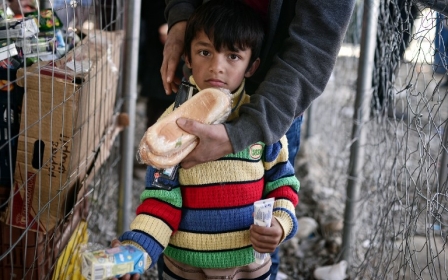Turkey seeks extra 3bn euros to take back refugees from EU

A deal between the EU and Turkey to curb the number of refugees and migrants travelling to Europe was delayed on Monday night after Ankara asked for an extra three billion euros ($3.3 bn) to pay for the deal.
The money would be in addition to same sum already pledged by the EU under a deal made in November, which later stalled.
European Council President Donald Tusk hailed the talks as a breakthrough and said EU leaders would work on the final details in time for a European summit starting on 17 March.
One in one out
Tusk said the deal meant all refugees arriving in Greece from Turkey will be sent back to Turkey.
With leaders saying that they "warmly welcomed" Turkey's proposals, Tusk told reporters: "We all of us are aware that in fact we have a breakthrough now."
But German Chancellor Angela Merkel was more cautious, saying: "It is a breakthrough if it becomes reality."
A European source, who spoke to AFP on condition of anonymity, added that if agreed the extra money "would not be a blank cheque" and would come with specific demands.
Refugees have been escaping Syria and Iraq to Turkey and then using the country as a base from which to seek passage to the mainland Europe, often risking perilous crossings on overcrowded boats to Greek islands.
"The Turks have asked for more money: three billion euros before 2018," European Parliament head Martin Schulz said on Monday after attending the opening session of an EU-Turkey summit dedicated to the crisis.
"It will require additional (EU) budgetary procedures. The European Parliament is prepared to speed up the procedures," he said.
Delayed aid
In Ankara, Turkish President Recep Tayyip Erdogan criticised the EU for the four-month delay of funds promised in the November deal.
"It's been four months. They are yet to deliver," Erdogan said in a speech in Ankara. "Mr prime minister is currently in Brussels. I hope he will return with the money."
More than one million refugees and migrants have arrived in Europe since the start of 2015 with nearly 4,000 dying while crossing the Mediterranean.
Earlier in the day, Turkish Prime Minister Ahmet Davutoglu had delayed proceedings by announcing what his spokesman called a "new proposal" at a lunch with EU leaders in Brussels, forcing them to extend the lunchtime summit until dinner to discuss his demands.
One EU diplomat told AFP Turkey was proposing "a potential gamechanger" where it will take back not only irregular economic migrants who have reached the Greek islands but also those from Syria deemed genuine refugees.
"In return, we have said for every Syrian they take back, we will resettle one Syrian" from camps in Turkey, where 2.7 million Syrian refugees are living, the diplomat added.
Turkey would also see visa-free travel brought forward to June if Ankara commits to immediately bringing into force the deal to readmit illegal migrants sent back from the Greek islands.
The next summit will now take place on 17-18 March, with the pressure on Europe to reach a deal that will stem a crisis that has seen more than a million refugees and migrants flood its shores since it began more than a year ago.
But securing a deal may still be difficult given the deep divisions that the migration crisis has sown in the bloc, and Hungary's hardline anti-migration Prime Minister Viktor Orban may veto the resettlement deal.
Meanwhile, Britain will not join any common EU asylum system, Prime Minister David Cameron said on Monday as leaders sought solutions to the continent's worst refugee crisis since World War II.
"The UK will not join a common asylum process in Europe - we have an absolutely rock solid opt-out," Cameron tweeted.
Middle East Eye propose une couverture et une analyse indépendantes et incomparables du Moyen-Orient, de l’Afrique du Nord et d’autres régions du monde. Pour en savoir plus sur la reprise de ce contenu et les frais qui s’appliquent, veuillez remplir ce formulaire [en anglais]. Pour en savoir plus sur MEE, cliquez ici [en anglais].




